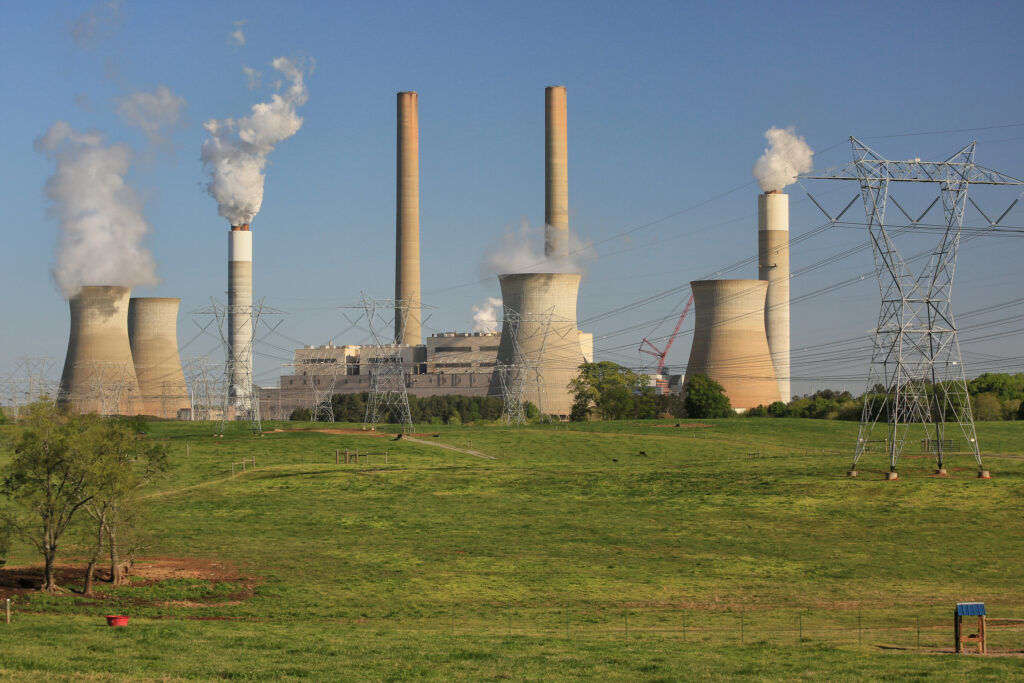Duke Energy can now backslide on its legally mandated carbon emissions reductions, offload a greater share of fuel costs to residential customers and charge ratepayers for financing costs of planned new power plants even if they’re never built.
On Tuesday the North Carolina House and Senate overrode Democratic Gov. Josh Stein’s veto of Senate Bill 266, “The Power Bill Reduction Act.”
Stein vetoed the measure July 2. “This summer’s record heat and soaring utility bills have shown that we need to focus on lowering electricity costs for working families—not raising them. … Additionally, this bill walks back our state’s commitment to reduce carbon emissions,” Stein wrote in his veto message.
The bill allows Duke Energy to amp up its use of natural gas while cancelling its interim carbon reduction goal of 70 percent by 2030. That benchmark, a crucial and highly lauded provision, was part of a climate law enacted by the legislature just four years ago.
The utility would still be required to achieve net-zero emissions by 2050. But National Oceanic and Atmospheric Administration scientists reported in 2022 that “without dramatic action in the next couple of decades, we are unlikely to keep global warming in this century below 2.7 degrees Fahrenheit compared to pre-industrial temperatures”—the threshold at which the most serious climate impacts can be mitigated.
“But the more we overshoot that threshold, the more serious and widespread the negative impacts will be,” the NOAA scientists wrote.

“Our planet is on fire,” said state Rep. Pricey Harrison, a Guilford County Democrat, on the House floor Tuesday, as she pleaded with her colleagues to sustain the governor’s veto. “We have got to reduce our carbon emissions.”
The new law was introduced in March as Senate Bill 261, sponsored by Republican Sen. Paul Newton, a former Duke Energy executive. (Newton resigned shortly after introducing the bill to accept a job as vice chancellor and general counsel for the University of North Carolina at Chapel Hill.)
At the time, Duke Energy spokesman Garrett Poorman told Inside Climate News that as North Carolina continues to experience unprecedented growth, “we’re focused on making substantial investments in our critical infrastructure to ensure reliability and keep costs as low and predictable as possible for our customers. We are supportive of policies that enable us to meet the state’s growing energy needs, including those that advance efficient and always-on baseload generation resources.”
The bill idled until early June, when its contents were cut and pasted into SB 266, which originally exempted buildings reconstructed after historic floods from floodplain requirements. Bill sponsors then rushed the measure through. Some members of the House Rules Committee had only 12 hours to review the measure before voting on it, Harrison said at the time, adding it became publicly available just 10 minutes before the committee hearing.
Bill sponsors and proponents, including Duke Energy, the N.C. Chamber, the American Petroleum Institute and the N.C. Manufacturers Alliance, have relied on an analysis by the Public Staff of the N.C. Utilities Commission to justify their claims that the measure will lower energy costs.


“This bill is about one thing: saving all consumers money on electric bills,” said Rep. Dean Arp, a Republican from Union County who co-sponsored the measure.
The Public Staff estimated that by eliminating Duke’s interim carbon reductions goal, ratepayers could save $13 billion in energy costs by 2050. However, that modeling did not account for the volatility in natural gas prices, nor the escalating costs of turbines required to build the new plants.
An analysis written by three N.C. State University environmental engineering professors accounted for those increases. They estimated that removing the interim target could cost ratepayers up to $23 billion in added fuel expenses over the same time. Even moderate increases in natural gas prices would hike fuel costs to $13.7 billion if the interim target is dropped, they found.
Earlier this week, two economists from Duke University’s Nicholas Institute for Energy, Environment & Sustainability reviewed that analysis and agreed with its overall findings. They additionally factored in the Trump administration’s rollbacks of incentives for renewable energy, which “are also likely to result in a grid that is more reliant on natural gas generation.”
A repeal or revision of the U.S. Environmental Protection Agency’s Final Greenhouse Gas Rule and its provisions for either carbon capture or limits on new gas units could also lead to additional demand for natural gas by utilities, according to the Duke University economists.
“This additional gas demand … may lead to higher natural gas prices in North Carolina and potentially increase volatility in gas markets,” they wrote.
Higher fuel costs won’t be apportioned equally among Duke Energy’s North Carolina customers. The new law now shifts 55 percent of fuel costs to residential customers, with 45 percent to commercial and industrial sectors. Previously, those costs were split 50-50.
The measure will also let Duke Energy charge financing costs of power plants to ratepayers before those facilities are built. Bill opponents are concerned that could saddle North Carolinians with higher electric bills if those projects are never finished.
This scenario played out in South Carolina, where ratepayers had to cover $9 billion in costs for the Summer nuclear plant, which was canceled because of higher-than-predicted costs.
After the override vote, Dan Crawford, the N.C. League of Conservation Voters’ director of governmental relations, released a statement: “Today, lawmakers chose to reward corporate greed over the people they were elected to serve. By overriding the governor’s veto, they handed Duke Energy a blank check—one that North Carolinians will be forced to pay.”
Drew Ball, Southeast campaigns director for the Natural Resources Defense Council, called the bill “a handout to Duke Energy that shifts billions in cost and significant risks squarely onto North Carolina families. … It pushes outdated, costly gas plants that deepen our dependence on a fragile fuel supply.”
Ball is also a commissioner for Buncombe County, an area that includes Asheville, one of the hardest-hit by Hurricane Helene. More than 40 people there died because of the storm, which a climate attribution study last year showed had more punishing rains as a result of global warming.
Opponents of SB 266 had scheduled a rally outside the legislature for late Monday afternoon. They canceled the event because the heat index was forecast to reach 115 degrees, an irony not lost on organizers.
As the House was holding its override vote mid-morning Tuesday, the heat index in Raleigh was already approaching 100—the 18th day this summer to hit this mark, according to WRAL meteorologists. Historical weather data shows that 2025 is on track to be the warmest on record in central North Carolina.
About This Story
Perhaps you noticed: This story, like all the news we publish, is free to read. That’s because Inside Climate News is a 501c3 nonprofit organization. We do not charge a subscription fee, lock our news behind a paywall, or clutter our website with ads. We make our news on climate and the environment freely available to you and anyone who wants it.
That’s not all. We also share our news for free with scores of other media organizations around the country. Many of them can’t afford to do environmental journalism of their own. We’ve built bureaus from coast to coast to report local stories, collaborate with local newsrooms and co-publish articles so that this vital work is shared as widely as possible.
Two of us launched ICN in 2007. Six years later we earned a Pulitzer Prize for National Reporting, and now we run the oldest and largest dedicated climate newsroom in the nation. We tell the story in all its complexity. We hold polluters accountable. We expose environmental injustice. We debunk misinformation. We scrutinize solutions and inspire action.
Donations from readers like you fund every aspect of what we do. If you don’t already, will you support our ongoing work, our reporting on the biggest crisis facing our planet, and help us reach even more readers in more places?
Please take a moment to make a tax-deductible donation. Every one of them makes a difference.
Thank you,

















